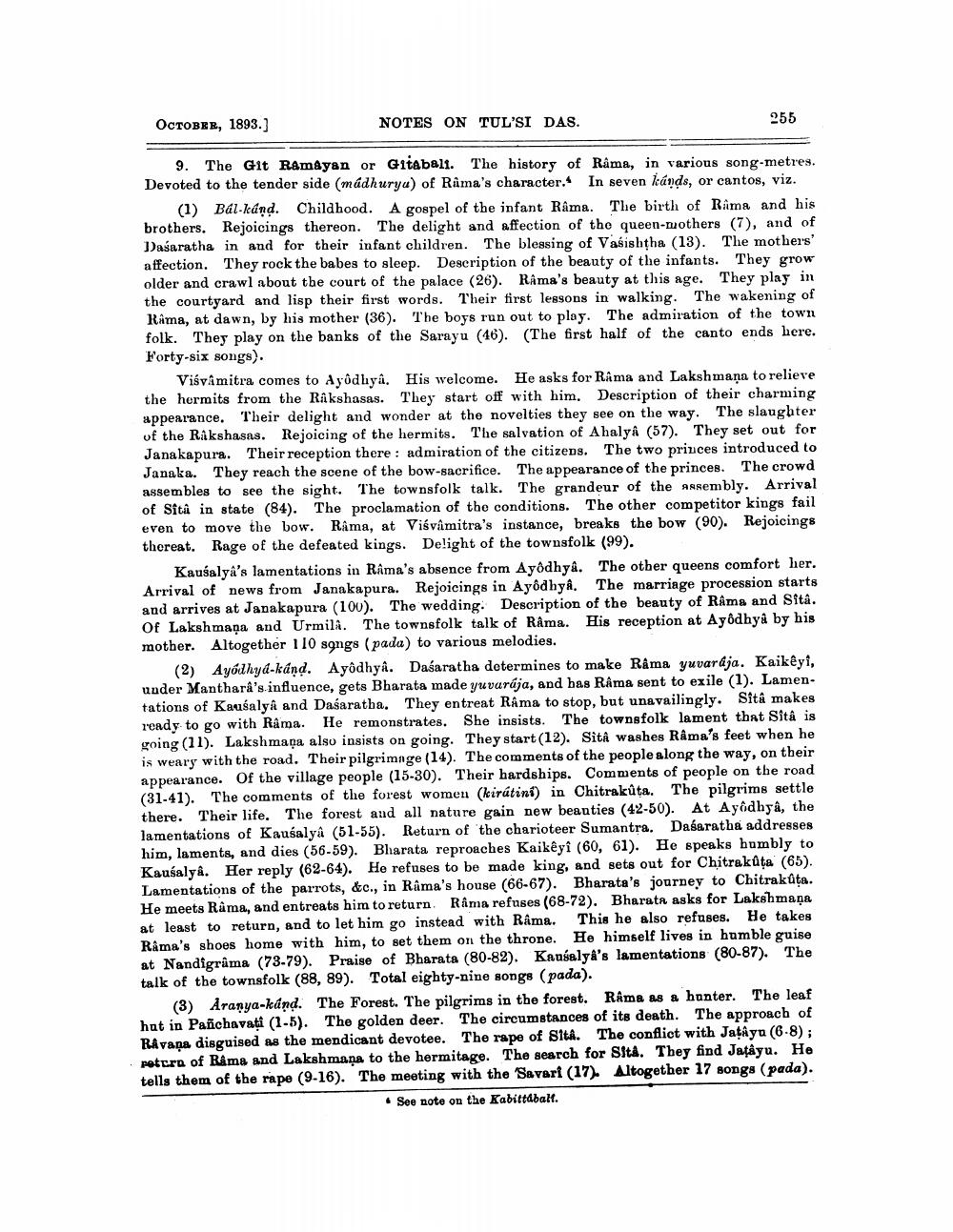________________
NOTES ON TUL'SI DAS.
255
OCTOBER, 1893.]
9. The Git Ramayan or Gitabali. The history of Rama, in various song-metres. Devoted to the tender side (mádhuryu) of Rama's character. In seven kands, or cantos, viz. (1) Bál-kúnd. Childhood. A gospel of the infant Râma. The birth of Rama and his brothers. Rejoicings thereon. The delight and affection of the queen-mothers (7), and of Dasaratha in and for their infant children. The blessing of Vasishtha (13). The mothers' affection. They rock the babes to sleep. Description of the beauty of the infants. They grow older and crawl about the court of the palace (26). Rama's beauty at this age. They play in the courtyard and lisp their first words. Their first lessons in walking. The wakening of Rama, at dawn, by his mother (36). The boys run out to play. The admiration of the town folk. They play on the banks of the Sarayu (46). (The first half of the canto ends here. Forty-six songs).
Visvamitra comes to Ayodhya. His welcome. He asks for Râma and Lakshmana to relieve the hermits from the Rakshasas. They start off with him. Description of their charming appearance. Their delight and wonder at the novelties they see on the way. The slaughter of the Rakshasas. Rejoicing of the hermits. The salvation of Ahalya (57). They set out for Janakapura. Their reception there: admiration of the citizens. The two princes introduced to Janaka. They reach the scene of the bow-sacrifice. The appearance of the princes. The crowd assembles to see the sight. The townsfolk talk. The grandeur of the assembly. Arrival of Sita in state (84). The proclamation of the conditions. The other competitor kings fail even to move the bow. Râma, at Viśvâmitra's instance, breaks the bow (90). Rejoicings thereat. Rage of the defeated kings. Delight of the townsfolk (99).
Kausalya's lamentations in Râma's absence from Ayodhyâ. The other queens comfort her. Arrival of news from Janakapura. Rejoicings in Ayodhyâ. The marriage procession starts and arrives at Janakapura (100). The wedding. Description of the beauty of Râma and Sîtâ. Of Lakshmana and Urmila. The townsfolk talk of Rama. His reception at Ayodhya by his mother. Altogether 110 songs (pada) to various melodies.
(2) Ayodhya-kand. Ayodhya. Dasaratha determines to make Rama yuvaraja. Kaikêyî, under Manthara's influence, gets Bharata made yuvarája, and has Râma sent to exile (1). Lamentations of Kausalya and Dasaratha. They entreat Râma to stop, but unavailingly. Sitâ makes ready to go with Râma. He remonstrates. She insists. The townsfolk lament that Sitâ is going (11). Lakshmana also insists on going. They start (12). Sitâ washes Râma's feet when he is weary with the road. Their pilgrimage (14). The comments of the people along the way, on their appearance. Of the village people (15-30). Their hardships. Comments of people on the road (31-41). The comments of the forest women (kirútini) in Chitrakuta. The pilgrims settle there. Their life. The forest and all nature gain new beauties (42-50). At Ayodhya, the lamentations of Kausalya (51-55). Return of the charioteer Sumantra. Dasaratha addresses him, laments, and dies (56-59). Bharata reproaches Kaikêyî (60, 61). He speaks humbly to Kausalya. Her reply (62-64). He refuses to be made king, and sets out for Chitrakuta (65). Lamentations of the parrots, &c., in Râma's house (66-67). Bharata's journey to Chitrakuta. He meets Râma, and entreats him to return. Râma refuses (68-72). Bharata asks for Lakshmana This he also refuses. He takes at least to return, and to let him go instead with Râma. Rama's shoes home with him, to set them on the throne. He himself lives in humble guise at Nandigrama (73-79). Praise of Bharata (80-82). Kausalya's lamentations (80-87). The talk of the townsfolk (88, 89). Total eighty-nine songs (pada).
(3) Aranya-kand. The Forest. The pilgrims in the forest. Râma as a hunter. The leaf hut in Panchavati (1-5). The golden deer. The circumstances of its death. The approach of Ravana disguised as the mendicant devotee. The rape of Sita. The conflict with Jatayu (6-8); return of Rama and Lakshmana to the hermitage. The search for Sita. They find Jatayu. He tells them of the rape (9-16). The meeting with the 'Savari (17). Altogether 17 songs (pada).
See note on the Kabittábalt.




